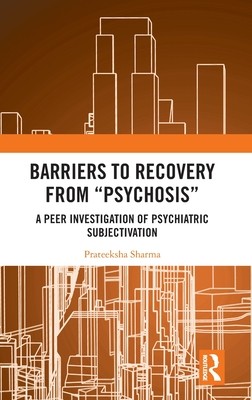
- We will send in 10–14 business days.
- Author: Prateeksha Sharma
- Publisher: Routledge Chapman & Hall
- ISBN-10: 1032158328
- ISBN-13: 9781032158327
- Format: 15.6 x 23.4 x 1.6 cm, kieti viršeliai
- Language: English
- SAVE -10% with code: EXTRA
Reviews
Description
This book inaugurates the field of Mad Studies in the Indian subcontinent investigating the barriers to recovery from the perspective of "patients" and caregivers.
Offering a radical critique of the mental health system, it questions why the phenomenon of recovery from serious mental health issues is not more widespread. Drawing from narratives of "patients", evidence from lived experiences around the globe and literature on recovery in psychiatry, mental health legislations and policies, it establishes the hitherto silenced voice of the "patient" as having testimonial viability, via an emancipatory scholarship. It highlights the repeated marginalization of "patients" and the identity prejudice they experience in day-to-day situations as a form of epistemic violence. The book examines the barriers to recovery through an interdisciplinary investigation, scrutinizing relationships between individuals and institutions at interpersonal, intersocial and global levels.
The book will be of interest to researchers and scholars of psychiatry, psychology, anthropology, sociology, disability studies, Mad Studies, law and policy, cultural studies, mental health, medicine as well as general readers.
EXTRA 10 % discount with code: EXTRA
The promotion ends in 23d.01:17:51
The discount code is valid when purchasing from 10 €. Discounts do not stack.
- Author: Prateeksha Sharma
- Publisher: Routledge Chapman & Hall
- ISBN-10: 1032158328
- ISBN-13: 9781032158327
- Format: 15.6 x 23.4 x 1.6 cm, kieti viršeliai
- Language: English English
This book inaugurates the field of Mad Studies in the Indian subcontinent investigating the barriers to recovery from the perspective of "patients" and caregivers.
Offering a radical critique of the mental health system, it questions why the phenomenon of recovery from serious mental health issues is not more widespread. Drawing from narratives of "patients", evidence from lived experiences around the globe and literature on recovery in psychiatry, mental health legislations and policies, it establishes the hitherto silenced voice of the "patient" as having testimonial viability, via an emancipatory scholarship. It highlights the repeated marginalization of "patients" and the identity prejudice they experience in day-to-day situations as a form of epistemic violence. The book examines the barriers to recovery through an interdisciplinary investigation, scrutinizing relationships between individuals and institutions at interpersonal, intersocial and global levels.
The book will be of interest to researchers and scholars of psychiatry, psychology, anthropology, sociology, disability studies, Mad Studies, law and policy, cultural studies, mental health, medicine as well as general readers.


Reviews